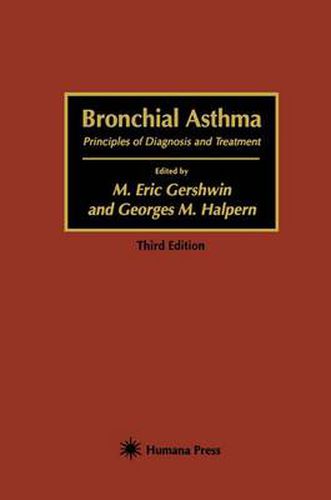Readings Newsletter
Become a Readings Member to make your shopping experience even easier.
Sign in or sign up for free!
You’re not far away from qualifying for FREE standard shipping within Australia
You’ve qualified for FREE standard shipping within Australia
The cart is loading…






This title is printed to order. This book may have been self-published. If so, we cannot guarantee the quality of the content. In the main most books will have gone through the editing process however some may not. We therefore suggest that you be aware of this before ordering this book. If in doubt check either the author or publisher’s details as we are unable to accept any returns unless they are faulty. Please contact us if you have any questions.
Although the mechanisms and triggers that stimulate and are responsible for the natural history ofasthma are steadily being more clearly defined, uncertainties still surround both the genetic basis and the etiologyofone of the most common syndromes in the world. In fact, it is ofconsider- able concern and interest that the incidence of asthma today appears to be rising. These statistical increments may only reflect an increasing awareness of the disease, or its earlier and more sophisticated diagnosis. More important, however, asthma mortality appears to be increasing. This increase has occurred despite the continuing expansion of a diag- nostic and management information base, and the developmentofnovel andevermoreeffective therapeutic modalities. Severalexplanations have been offered for this increase in mortality, including that it may result from a statistical artifact [based on a change in the coding criteria for asthma from the International ClassificationofDiseases Version 8(ICD- 8) to ICD-9], worsened pollution, delays in seeking medical help, behav- ioral changes, deficits in the asthma education of both patients and primary careproviders, toxicity ofbeta-agonists, and noncompliance with instructions for the proper use of medications. It should also be empha- sized that the increases in both incidence and mortality may be a reflec- tion of accumulating body burdens of environmental toxicants and of increased oxidativedamage. There has clearly beenadegradation ofenvi- ronmental quality. And although considerableattention has been focused on this possibility in both the scientific and lay press, more research in this area is definitely needed.
$9.00 standard shipping within Australia
FREE standard shipping within Australia for orders over $100.00
Express & International shipping calculated at checkout
This title is printed to order. This book may have been self-published. If so, we cannot guarantee the quality of the content. In the main most books will have gone through the editing process however some may not. We therefore suggest that you be aware of this before ordering this book. If in doubt check either the author or publisher’s details as we are unable to accept any returns unless they are faulty. Please contact us if you have any questions.
Although the mechanisms and triggers that stimulate and are responsible for the natural history ofasthma are steadily being more clearly defined, uncertainties still surround both the genetic basis and the etiologyofone of the most common syndromes in the world. In fact, it is ofconsider- able concern and interest that the incidence of asthma today appears to be rising. These statistical increments may only reflect an increasing awareness of the disease, or its earlier and more sophisticated diagnosis. More important, however, asthma mortality appears to be increasing. This increase has occurred despite the continuing expansion of a diag- nostic and management information base, and the developmentofnovel andevermoreeffective therapeutic modalities. Severalexplanations have been offered for this increase in mortality, including that it may result from a statistical artifact [based on a change in the coding criteria for asthma from the International ClassificationofDiseases Version 8(ICD- 8) to ICD-9], worsened pollution, delays in seeking medical help, behav- ioral changes, deficits in the asthma education of both patients and primary careproviders, toxicity ofbeta-agonists, and noncompliance with instructions for the proper use of medications. It should also be empha- sized that the increases in both incidence and mortality may be a reflec- tion of accumulating body burdens of environmental toxicants and of increased oxidativedamage. There has clearly beenadegradation ofenvi- ronmental quality. And although considerableattention has been focused on this possibility in both the scientific and lay press, more research in this area is definitely needed.